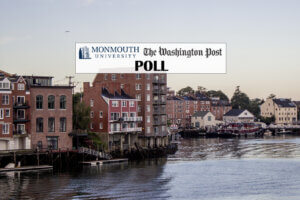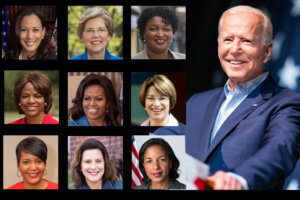West Long Branch, NJ – Former Vice President Joe Biden is the clear front-runner for New Hampshire’s first-in-the-nation Democratic primary, according to the first Monmouth University Poll of Granite State primary voters in the 2020 cycle. One-third of voters say that finding a candidate who will carry on former President Barack Obama’s legacy is very important to them and there is little difference in levels of candidate support by the importance voters place on Obama’s legacy. On the other hand, two-thirds of primary voters point to finding a nominee who can beat President Donald Trump as more important to them than agreement on the issues.
In a field of 24 announced and potential candidates, Biden holds a clear lead with 36% support of registered Democrats and unaffiliated voters who are likely to participate in the February 2020 primary. He is followed by Vermont Sen. Bernie Sanders at 18%. Other contenders include South Bend Mayor Pete Buttigieg (9%), Massachusetts Sen. Elizabeth Warren (8%), and California Sen. Kamala Harris (6%). Registering at least 1% in the poll are former Texas Rep. Beto O’Rourke (2%), Minnesota Sen. Amy Klobuchar (2%), New Jersey Sen. Cory Booker (2%), former Colorado Gov. John Hickenlooper (1%), Ohio Rep. Tim Ryan (1%), and entrepreneur Andrew Yang (1%). The remaining 13 candidates earn less than 1% or were not chosen by any respondents in the poll.
Biden does especially well among voters aged 65 and older, garnering 53% support with this group compared to only 9% for Sanders. The former vice president also bests Sanders by 36% to 19% among those aged 50 to 64, but he trails the Vermont senator by 20% to 27% among voters under the age of 50. Biden tops Sanders by 45% to 10% among self-described moderates and conservatives, but he lags by 23% to 29% among liberals. A majority of likely Democratic primary voters (58%) describe themselves as moderates or conservatives in New Hampshire, a state that allows unaffiliated voters to participate in either party’s primary.
“As other polls have shown, Biden officially enters the race as a clear front-runner. He is the preferred candidate of voters who want someone to take up Obama’s mantle but it does not seem that this is a decisive factor right now,” said Patrick Murray, director of the independent Monmouth University Polling Institute.
Biden’s entry has raised the question of what role his former boss, President Barack Obama, will play in the race. One-third of likely Democratic voters in New Hampshire (34%) say that nominating someone who will build on Obama’s legacy is very important to them. Another 38% say it is somewhat important, 21% say it is not important, and 7% are unsure. Liberals (40%) are more likely than moderates (29%) and women (41%) are more likely than men (24%) to prefer a nominee who is seen as following in Obama’s footsteps. There does not appear to be a definitive “Obama lane” in this race, but Biden holds the lead with voters who say the former president’s legacy is a factor. Among those who say Obama is very important, 39% currently support Biden while 15% support Sanders, followed by Buttigieg (10%), Harris (9%), Warren (8%), Booker (3%), and Klobuchar (3%). Among those who say Obama’s legacy is somewhat important, 39% support Biden to 20% for Sanders, followed by Buttigieg (9%), Warren (8%), and Harris (5%). Among those who say it is not important or have no opinion on the importance of Obama’s legacy, 30% support Biden and 19% back Sanders, followed by Warren (10%), Buttigieg (7%), Harris (5%), and O’Rourke (3%).
“While Democrats may have positive feelings about Obama, the current White House occupant is a much more significant factor in the 2020 primary. In fact, it really isn’t an either-or calculation. Voters who value Obama’s legacy say the best way to preserve it is to beat Trump in 2020,” said Murray
The overwhelming majority (68%) of likely Democratic voters prefer to have a nominee who would be a strong candidate against Trump even if they disagree with that candidate on most issues. If they were forced to choose, just 25% say they would favor a Democratic candidate who they are aligned with on the issues even if that person would have a hard time beating Trump. Among those who say having a nominee that builds on Obama’s legacy is very important to them, 79% prioritize beating Trump while just 15% say they want a candidate who they agree with on the issues even if he or she would be weaker against the incumbent.
Biden garners somewhat more support among voters who prioritize beating Trump (39%) than he does among those who are looking for issue alignment in their nominee (32%). Sanders, on the other hand, does much better with “issue” voters (33%) than “electability” voters (13%). Harris does slightly better with electability voters (8%) than issue voters (4%). There are no significant differences in support for other candidates between these two types of voters.
While beating Trump at the ballot box is a priority for most New Hampshire Democratic primary voters, just 20% say it is very important to them that the party nominates someone who supports impeaching Trump now. Another 18% say it is somewhat important, while most say it is not an important consideration (54%) or are not sure (7%). It’s worth noting, though, that among those who say a nominee who supports impeaching Trump is very important to them, 49% back Biden. Biden recently said that Congress would have to pursue impeachment if Trump blocked their investigation of issues arising from the Mueller report.
The Monmouth University Poll also asked voters to rate 22 announced and 2 potential candidates in the race. Biden holds the most positive rating at 80% favorable to 15% unfavorable. Sanders also has a strong rating at 73% to 19%. Warren, New Hampshire’s other neighboring-state senator in the field, has the third highest favorability rating in the field at 63%, but also has one of the highest unfavorable ratings at 24%.
|
2020 DEMOCRATIC FIELD NEW HAMPSHIRE PARTY VOTER OPINION | ||||
| Total w/ opinion | Net rating | Favorable | Unfavorable | |
| 95 | Joe Biden | +65 | 80 | 15 |
| 92 | Bernie Sanders | +54 | 73 | 19 |
| 87 | Elizabeth Warren | +39 | 63 | 24 |
| 70 | Kamala Harris | +50 | 60 | 10 |
| 66 | Cory Booker | +42 | 54 | 12 |
| 61 | Pete Buttigieg | +47 | 54 | 7 |
| 61 | Beto O’Rourke | +29 | 45 | 16 |
| 55 | Amy Klobuchar | +33 | 44 | 11 |
| 52 | Kirsten Gillibrand | +18 | 35 | 17 |
| 48 | Bill de Blasio | –10 | 19 | 29 |
| 43 | Julián Castro | +17 | 30 | 13 |
| 36 | Tulsi Gabbard | +10 | 23 | 13 |
| 34 | Seth Moulton | +6 | 20 | 14 |
| 33 | John Hickenlooper | +11 | 22 | 11 |
| 25 | Andrew Yang | –3 | 11 | 14 |
| 24 | John Delaney | +4 | 14 | 10 |
| 24 | Jay Inslee | +6 | 15 | 9 |
| 23 | Eric Swalwell | +7 | 15 | 8 |
| 20 | Tim Ryan | 0 | 10 | 10 |
| 19 | Michael Bennet | +5 | 12 | 7 |
| 16 | Marianne Williamson | –4 | 6 | 10 |
| 13 | Steve Bullock | +1 | 7 | 6 |
| 13 | Mike Gravel | –5 | 4 | 9 |
| 11 | Wayne Messam | –5 | 3 | 8 |
Biden has somewhat better ratings among moderates (83% to 12%) than he does among liberals (75% to 20%). He also has stronger ratings among voters aged 65 and older (89% to 7%) and those aged 50 to 64 (80% to 14%) than he does among those under 50 years old (70% to 24%). Sanders is viewed significantly more positively among liberals (86% to 12%) than he is among moderates (64% to 25%). Warren does about as well as Sanders among liberals (82% to 11%) but does worse among moderates (50% to 34%). Warren also has one of the largest income-based differences in her ratings of any Democrat in the field. Among primary voters earning less than $50,000 a year, she earns a healthy 72% favorable to 10% unfavorable rating. That gap narrows to 61% favorable and 26% unfavorable among those earning between $50,000 and $100,000 and to 59% favorable and 34% unfavorable among those with annual incomes over $100,000.
Other relatively well-known candidates include Harris (60% favorable to 10% unfavorable), Booker (54% to 12%), Buttigieg (54% to 7%), O’Rourke (45% to 16%), Klobuchar (44% to 11%), New York Senator Kirsten Gillibrand (35% to 17%), and former Obama administration cabinet secretary Julián Castro (30% to 13%). Also, as-yet-undeclared candidate New York City Mayor Bill de Blasio has a net negative net rating of 19% favorable to 29% unfavorable, making him the only contender with a higher negative rating than Warren. No more than one-third of likely caucusgoers are able to offer an opinion of the remaining 13 candidates.
Comparing these New Hampshire results to a Monmouth poll of likely Iowa caucusgoers conducted last month finds that O’Rourke is less well-known and gets lower positive ratings in the Granite State (45% favorable to 16% unfavorable) than he does in the Hawkeye State (60% to 13%). Massachusetts Rep. Seth Moulton is better-known and better-liked in New Hampshire (20% to 14%) than he was in Iowa one month ago (5% to 6%). Former Maryland Rep. John Delaney is not as well-known or well-liked in New Hampshire (14% to 10%) as he is in Iowa (31% to 12%). Differences in ratings between the two states for the other Democratic candidates are generally within the margin of error.
The top issue that New Hampshire Democrats are thinking about in choosing a presidential nominee is health care (41%), followed by environmental concerns (12% climate change and 12% environment in general), honesty and integrity (13%), and beating Trump (11%). Other issues that are important to voters include immigration (9%), education (9%), jobs (9%), Social Security (7%), paying for college (6%), taxes (6%), competence and experience (6%), income inequality (6%), civil rights (6%), foreign policy (6%), reproductive rights (5%), gun control (4%), and a number of other issues named by 3% or less. Health care is the top concern in all demographic groups. However, the combination of honesty and beating Trump (24% overall), is more important for voters aged 65 and older (34%) or 50 to 64 years old (27%) than it is for voters under 50 years old (10%).
Democratic activists have been trying to move the party to the left on both health care and the environment. Nearly half of likely voters (48%) say it is very important to them that the party nominates someone who supports “Medicare for All.” Another 31% say this is somewhat important, 14% say it is not important, and 7% are not sure. Fewer than 3-in-10 likely voters (28%) say it is very important to them that the party nominates someone who supports the “Green New Deal.” Another 36% say this is somewhat important, 17% say it is not important, and 19% are not sure. Poll findings on the importance of these issues are very similar to the results of a Monmouth poll of likely Iowa caucusgoers conducted last month. Among those who say Medicare for All is very important, 29% support Biden and 27% support Sanders. Among those who say the Green New Deal is very important it is the same – 29% support Biden and 27% support Sanders.
“As in Iowa, New Hampshire Democrats are focused on health care. If this becomes a defining issue in the early contests, it could boost Sanders or another contender who is currently in the back of the pack,” said Murray.
The Monmouth University Poll was conducted by telephone from May 2 to 7, 2019 with 376 New Hampshire voters who are likely to vote in the Democratic presidential primary in February 2020, out of 987 registered voters that were contacted for the poll. The question results in this release have a margin of error of +/- 5.1 percentage points. The poll was conducted by the Monmouth University Polling Institute in West Long Branch, NJ.
QUESTIONS AND RESULTS
(* Some columns may not add to 100% due to rounding.)
1. If the Democratic primary election for president was today, would you vote for [NAMES WERE ROTATED]? [If UNDECIDED: If you had to vote for one of these candidates at this moment, who do you lean toward?]
| (with leaners) |
May 2019 |
| Joe Biden | 36% |
| Bernie Sanders | 18% |
| Pete Buttigieg | 9% |
| Elizabeth Warren | 8% |
| Kamala Harris | 6% |
| Cory Booker | 2% |
| Amy Klobuchar | 2% |
| Beto O’Rourke | 2% |
| John Hickenlooper | 1% |
| Tim Ryan | 1% |
| Andrew Yang | 1% |
| Steve Bullock | <1% |
| John Delaney | <1% |
| Tulsi Gabbard | <1% |
| Kirsten Gillibrand | <1% |
| Marianne Williamson | <1% |
| Michael Bennet | 0% |
| Julián Castro | 0% |
| Bill de Blasio | 0% |
| Mike Gravel | 0% |
| Jay Inslee | 0% |
| Wayne Messam | 0% |
| Seth Moulton | 0% |
| Eric Swalwell | 0% |
| (VOL) No one | <1% |
| (VOL) Undecided | 11% |
| (n) | (376) |
2. And who would be your second choice?
|
May 2019 | |
| Elizabeth Warren | 15% |
| Kamala Harris | 12% |
| Joe Biden | 11% |
| Bernie Sanders | 11% |
| Pete Buttigieg | 9% |
| Cory Booker | 5% |
| Beto O’Rourke | 4% |
| Amy Klobuchar | 3% |
| Bill de Blasio | 1% |
| John Delaney | 1% |
| Kirsten Gillibrand | 1% |
| John Hickenlooper | 1% |
| Andrew Yang | 1% |
| Michael Bennet | <1% |
| Julián Castro | <1% |
| Jay Inslee | <1% |
| Seth Moulton | <1% |
| Steve Bullock | 0% |
| Tulsi Gabbard | 0% |
| Mike Gravel | 0% |
| Wayne Messam | 0% |
| Tim Ryan | 0% |
| Eric Swalwell | 0% |
| Marianne Williamson | 0% |
| (VOL) No one | 5% |
| (VOL) Undecided | 22% |
| (n) | (376) |
3. I’m going to read you the names of some people who are running or might run for president in 2020. Please tell me if your general impression of each is favorable or unfavorable, or if you don’t really have an opinion. If you have not heard of the person, just let me know. [NAMES WERE ROTATED]
| Favorable | Unfavorable | No opinion | Not heard of | (n) | |
| Former Vice President Joe Biden | 80% | 15% | 5% | 0% | (376) |
| Vermont Senator Bernie Sanders | 73% | 19% | 8% | 0% | (376) |
| Massachusetts Senator Elizabeth Warren | 63% | 24% | 11% | 2% | (376) |
| Former Texas Congressman Beto O’Rourke | 45% | 16% | 24% | 15% | (376) |
| California Senator Kamala Harris | 60% | 10% | 15% | 14% | (376) |
| Minnesota Senator Amy Klobuchar | 44% | 11% | 25% | 20% | (376) |
| South Bend, Indiana Mayor Pete Buttigieg | 54% | 7% | 19% | 21% | (376) |
| New Jersey Senator Cory Booker | 54% | 12% | 22% | 13% | (376) |
| New York Senator Kirsten Gillibrand | 35% | 17% | 33% | 14% | (376) |
| Former cabinet secretary Julián Castro | 30% | 13% | 36% | 21% | (376) |
| Former Maryland Congressman John Delaney | 14% | 10% | 45% | 31% | (376) |
| Former Colorado Governor John Hickenlooper | 22% | 11% | 35% | 31% | (376) |
| Hawaii Congresswoman Tulsi Gabbard | 23% | 13% | 31% | 33% | (376) |
| Washington Governor Jay Inslee | 15% | 9% | 35% | 41% | (376) |
| Entrepreneur Andrew Yang | 11% | 14% | 30% | 45% | (376) |
| Author Marianne Williamson | 6% | 10% | 27% | 56% | (376) |
| Miramar, Florida Mayor Wayne Messam | 3% | 8% | 28% | 61% | (376) |
| Former Alaska Senator Mike Gravel | 4% | 9% | 35% | 52% | (376) |
| Ohio Congressman Tim Ryan | 10% | 10% | 42% | 39% | (376) |
| Massachusetts Congressman Seth Moulton | 20% | 14% | 35% | 31% | (376) |
| California Congressman Eric Swalwell | 15% | 8% | 31% | 46% | (376) |
| Montana Governor Steve Bullock | 7% | 6% | 35% | 53% | (376) |
| Colorado Senator Michael Bennet | 12% | 7% | 38% | 42% | (376) |
| New York City Mayor Bill de Blasio | 19% | 29% | 39% | 12% | (376) |
4. Which type of candidate would you prefer if you had to make a choice between: a Democrat you agree with on most issues but would have a hard time beating Donald Trump or a Democrat you do NOT agree with on most issues but would be a stronger candidate against Donald Trump? [CHOICES WERE ROTATED]
|
May 2019 | |
| Agrees with but hard time beating Trump | 25% |
| Do not agree with but stronger against Trump | 68% |
| (VOL) Rejects choice / no need to pick between two | 3% |
| (VOL) Don’t know | 4% |
| (n) | (376) |
5. What are the one or two most important issues to you in deciding who to support for the Democratic nomination? [LIST WAS NOT READ]
[Note: Results add to more than 100% because multiple responses were accepted]
|
May 2019 | |
| Jobs, unemployment | 9% |
| Bills, food, groceries | 1% |
| College tuition, school costs | 6% |
| Health care | 41% |
| Social Security, seniors | 7% |
| Taxes | 6% |
| Climate change, global warming | 12% |
| Environment, pollution | 12% |
| Opioids, drug use | 2% |
| Safety, crime | 0% |
| Guns, gun control | 4% |
| Terrorism, national security | 1% |
| Immigration | 9% |
| Schools, education | 9% |
| Civil rights | 6% |
| Reproductive rights, women | 5% |
| Honesty, integrity | 13% |
| Competence, experience | 6% |
| Income inequality, wages | 6% |
| Infrastructure | 3% |
| Foreign policy, world standing | 6% |
| Balance budget | 2% |
| Donald Trump, beating Trump | 11% |
| Other | 5% |
| Don’t know | 3% |
| (n) | (376) |
[QUESTIONS 6-8 WERE ROTATED]
6. How important is it to you that the Democrats nominate someone who supports the Green New Deal – very important, somewhat important, not important, or are you not sure?
|
May 2019 | |
| Very important | 28% |
| Somewhat important | 36% |
| Not important | 17% |
| Not sure | 19% |
| (n) | (376) |
7. How important is it to you that the Democrats nominate someone who supports Medicare for All – very important, somewhat important, not important, or are you not sure?
|
May 2019 | |
| Very important | 48% |
| Somewhat important | 31% |
| Not important | 14% |
| Not sure | 7% |
| (n) | (376) |
8. How important is it to you that the Democrats nominate someone who supports impeaching Donald Trump – very important, somewhat important, not important, or are you not sure?
|
May 2019 | |
| Very important | 20% |
| Somewhat important | 18% |
| Not important | 54% |
| Not sure | 7% |
| (n) | (376) |
9. How important is it to you that the Democrats nominate someone who will build on the legacy of Barack Obama – very important, somewhat important, not important, or are you not sure?
|
May 2019 | |
| Very important | 34% |
| Somewhat important | 38% |
| Not important | 21% |
| Not sure | 7% |
| (n) | (376) |
METHODOLOGY
The Monmouth University Poll was sponsored and conducted by the Monmouth University Polling Institute from May 2 to 7, 2019 with a statewide random sample of 987 New Hampshire voters drawn from a list of registered voters who participated in a primary election in the past two election cycles or voted in both the 2016 and 2018 general elections. Results are based on 376 voters who are likely to vote in the Democratic presidential primary in February 2020. This includes 218 contacted by a live interviewer on a landline telephone and 158 contacted by a live interviewer on a cell phone, in English. Monmouth is responsible for all aspects of the survey design, data weighting and analysis. Final sample is weighted for party registration, age, gender, race, and education based on state voter registration list information and U.S. Census information. Data collection support provided by Braun Research (field) and Aristotle (voter sample). For results based on the sample of 376 likely Democratic primary voters, one can say with 95% confidence that the error attributable to sampling has a maximum margin of plus or minus 5.1 percentage points (unadjusted for sample design). Sampling error can be larger for sub-groups (see table below). In addition to sampling error, one should bear in mind that question wording and practical difficulties in conducting surveys can introduce error or bias into the findings of opinion polls.
| DEMOGRAPHICS (weighted) |
| Party Registration |
| 61% Democrat |
| 38% None, other |
| Self-Reported Party |
| 50% Democrat |
| 50% Other |
| 42% Male |
| 58% Female |
| 15% 18-34 |
| 18% 35-49 |
| 33% 50-64 |
| 34% 65+ |
| 96% White, non-Hispanic |
| 4% Other race, Hispanic |
| 42% No college degree |
| 58% College graduate |
Click on pdf file link below for full methodology and crosstabs by key demographic groups.




